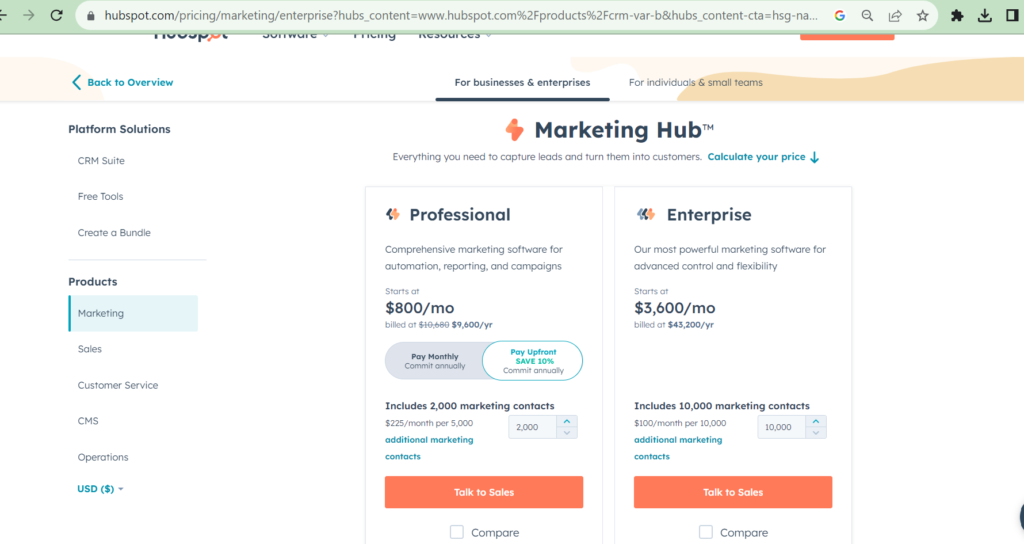Top 12 Best Free Online Business Tools for Startups / Small Businesses (Year 2023)
Customer Relationship Management (CRM) at a glance (example – HubSpot CRM, Zoho CRM, Salesforce).
Effective customer relationship management is essential. Solutions are available for maintaining contacts, tracking leads, and examining customer interactions through HubSpot CRM, Zoho CRM, and Salesforce. These technologies offer insights that help guide marketing and sales tactics.
HubSpot CRM: Powering Customer-Centric Growth

The sophisticated customer relationship management platform HubSpot CRM is designed for companies looking for a single point of contact, sales, and marketing management. HubSpot CRM gives companies the tools they need to nurture leads, close transactions, and improve customer interactions with a focus on usability and integration.
Key Features:
- Contact Management: Organize and save customer data, communications, and interactions.
- Deal Tracking: Organize sales pipelines, monitor deals at different levels, and project sales.
- Marketing Automation: To nurture prospects and automate marketing campaigns, seamlessly integrate with HubSpot’s marketing solutions.
- Email Tracking: To improve communication strategy, track email opens, clicks, and engagement.
- Analytics: To keep track of marketing and sales progress, use real-time reports and dashboards.
Practical Use Case:
Based on their past purchases and preferences, clients can be divided into groups by an e-commerce company using HubSpot CRM. They may develop tailored email campaigns to propose products and encourage repeat sales by integrating email marketing.
Zoho CRM: Customizable Relationship Management

For enterprises in a variety of industries, Zoho CRM provides a flexible and adaptable solution to client relationship management. Zoho CRM fits to specific business demands with a variety of modules and capabilities, facilitating efficient lead creation, customer engagement, and sales optimization.
Key Features:
- Lead Management: Leads should be gathered from diverse sources, qualified, and given to sales teams.
- Workflow Automation: Create unique workflows to streamline operations and automate tedious chores.
- Social Media Integration: Follow up with leads and interact with customers on social media.
- Sales Analytics: Keep tabs on revenue trends, sales performance, and predicted results.
- Integration: increase functionality by seamlessly integrating with other Zoho apps and outside technologies.
Practical Use Case:
To handle property listings, track client queries, and automate follow-up procedures, a real estate agency can use Zoho CRM. Personalized messages can be triggered by custom workflows depending on client choices and property interests.
Salesforce: Enterprise-Grade CRM Solution

A recognized CRM platform, Salesforce offers a variety of tools for sales, marketing, customer care, and more. It serves organizations of all sizes. Salesforce is especially well suited for enterprise-level businesses looking to improve customer relations and corporate operations thanks to its scalability and customisation capabilities.
Key Features:
- 360-Degree View: Learn everything there is to know about consumer interactions, preferences, and touchpoints.
- Sales Cloud: Utilize customisable dashboards to manage leads, opportunities, and accounts.
- Service Cloud: Utilize case management and knowledge bases to deliver effective customer assistance.
- Marketing Cloud: Implement targeted marketing initiatives and assess their success.
- AppExchange: To increase functionality, use a huge selection of integrations and apps from third parties.
Practical Use Case:
Salesforce can be used by a multinational organization to combine client data from several areas and departments. The company may improve client experiences by offering dependable assistance, customizing marketing initiatives, and optimizing sales processes using its Sales, Service, and Marketing Clouds.
Conclusion (Customer Relationship Management (CRM) Tools – HubSpot CRM, Zoho CRM, Salesforce):
Three well-known CRM providers—HubSpot CRM, Zoho CRM, and Salesforce—serve a variety of business types and sizes. These platforms enable businesses to manage customer connections, streamline sales processes, and drive growth through improved client experiences, regardless of whether you’re looking for user-friendliness, customisation, or enterprise-grade solutions.
Here is a broad explanation of how each CRM’s subscription plans might operate:
Customer relationship management (CRM) software subscriptions involve picking a subscription plan that works for your company’s needs, such as HubSpot CRM, Zoho CRM, and Salesforce.
HubSpot CRM:
- Free Plan: Basic CRM features, contact management, deal tracking, and email integration.
- Starter Plan: Enhanced features including contact website activity tracking, basic marketing automation, and reporting.
- Professional Plan: Advanced features such as marketing automation, sales automation, custom reporting, and more.
- Enterprise Plan: Additional advanced features including predictive lead scoring, multi-touch revenue attribution, and custom event triggers.
Zoho CRM:
- Free Edition: Basic CRM features for up to 3 users, lead and contact management.
- Standard Plan: Enhanced features including sales forecasting, workflow automation, and document library.
- Professional Plan: Advanced features such as sales signals, email integration, and inventory management.
- Enterprise Plan: Additional features including territory management, custom modules, and advanced analytics.
Salesforce:
- Essentials: Basic CRM features for small businesses, including contact and opportunity management.
- Professional: Enhanced features including advanced reporting, forecasting, and workflow automation.
- Enterprise: Advanced features such as role-based access, sales process automation, and custom app development.
- Unlimited: Additional features including unlimited support, advanced analytics, and increased storage.
To acquire the most recent details on pricing and features, make sure to visit these CRM companies’ official websites. The number of users, the size of your company, your unique requirements, and the features you need to manage your client interactions efficiently should all be taken into account when choosing a plan.


One Response